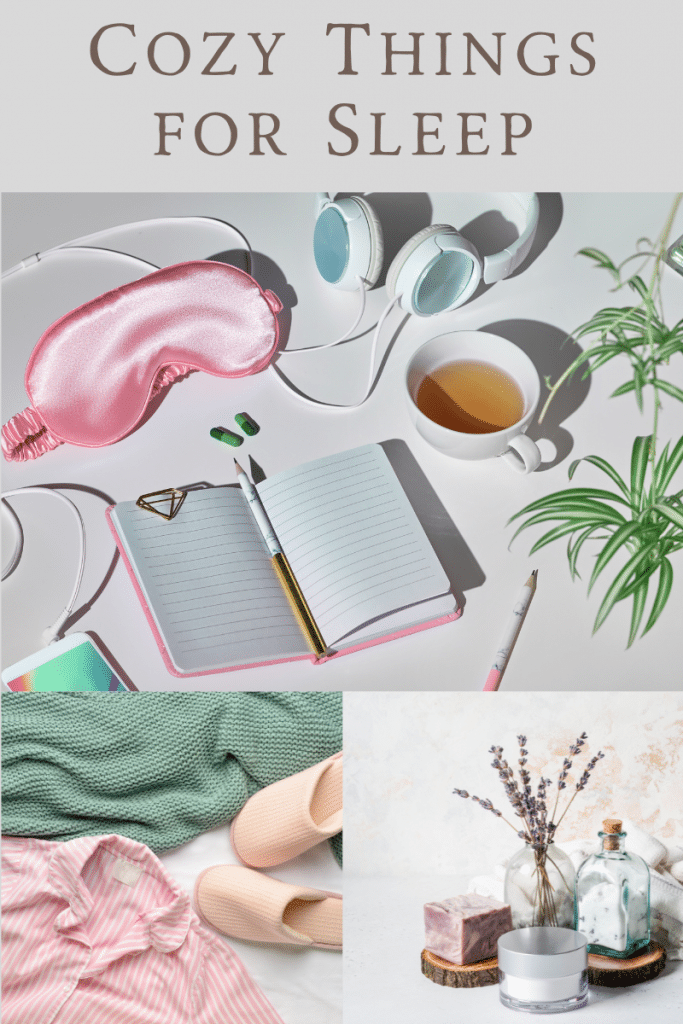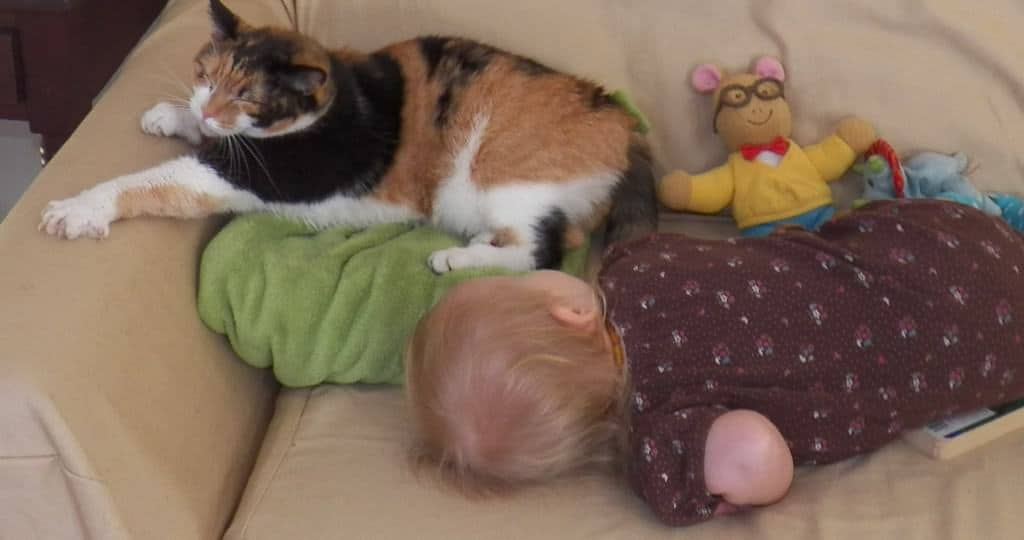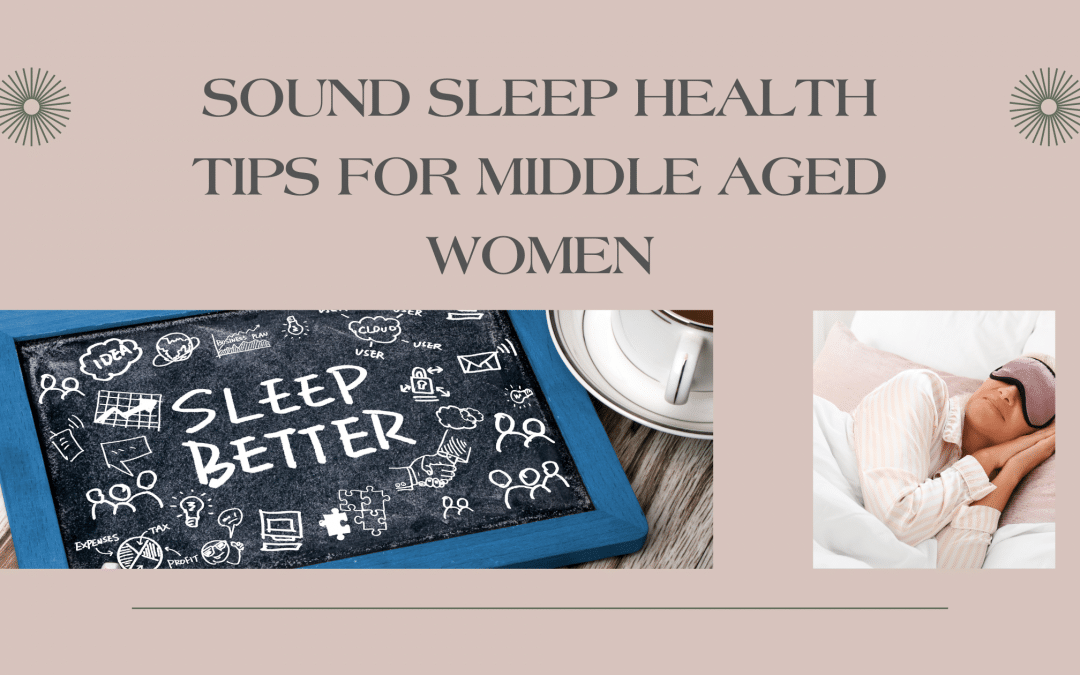Sound Sleep Health
If you are a woman over 40 and have been looking for ways to get a better night’s sleep, this post is for you!
I recently attended a webinar on integrative nutrition where our guest speaker shared having adequate sleep may be even more important than what we eat and how much we exercise! That wasn’t good news for me at the time since I struggled with my sleep, but I have been working hard to improve it, and it is working!
Better Night’s Sleep Provides Health Benefits
Lack of “shut eye” has been linked to increased inflammation in the body, which is a major factor in many chronic diseases such as obesity, heart disease, diabetes, cancer, and autoimmune conditions. Research links obesity with lack of sleep and many of us have been guilty of nibbling to stay awake.
Our bad sleep habits may not only affect just us but may affect others also, the National Department of Transportation estimates that drowsy driving may be linked to 1,550 fatalities and 40,000 nonfatal injuries a year in the U.S.
How Much Sleep Do We Need
It depends on where you are in the life cycle. Check out this informative chart from the Sleep Foundation .
However, the average American adult gets much less good night’s sleep than they need at about 6.8 hours on average. It also seems that once we miss this sleep, it is challenging to catch up on it!
Having a chance to get the entire sleep for the evening instead of broken sleep is very important because our body needs to be able to get into REM sleep for our body to maintain its circadian rhythm. The sleep foundation calls this the body clock or sleep drive. People who work the night shift and different shifts may have a difficult time with this and need to work hard to maintain this pattern.
Why We Don’t Get Enough Sleep
There are many reasons we have challenges getting some sleep, some of these include:
1. Many of us are trying to cram too much on our already crowded schedule but we don’t make it a priority to include getting a good night’s sleep on the calendar. The American work week has gone from a 40-hour week to a 60-80-hour week for some of us.
2. We have too much on our minds. For some of us, this could be worry and stress. How many times have worries kept
us up half the night or all night?
3. Sometimes, we might try as hard as we can but still not fall asleep. For some of us, it could be hormonal; for others, it
could be caffeine or alcohol. Some of us are too uptight to even get to sleep.
4. Even some of us are choosing not to get our rest. Electronic devices, social media, the internet, and program watching
distract us from giving our bodies the rest they deserve.
Menopause and Sleep Apnea
Why do I get enough sleep but still feel exhausted in the morning and throughout the day?
Let’s talk about menopause and snoring. Women who snore and are often overweight may have sleep apnea, a condition where their hearts stop during short periods of sleep. Several types of sleep apnea treatments, including weight loss, can treat the condition.
There is evidence that once a woman reaches menopause, the risk for sleep apnea increases. This information is helpful on menopause and sleep apnea and discusses symptoms and preventive ways to treat this serious medical condition.
I will also talk more about other sleep challenges that we may face as middle-aged women in this article.
Let’s look at ways to help improve your quality of sleep and how to help prevent insomnia
Are You Getting Restorative Sleep?
If you are still feeling tired after 8 hours of sleep, your sleep quality may be affected. The key to improving your quality of sleep may be related to what you think before you go to bed.
How to get more restorative sleep?
Here are a few tips from a psychologist to improve your quality of sleep.
Our quality of sleep affects how rested we feel in the morning. It is important to go through the cycles of sleep. This is a good article on the cycles of sleep.
Why Can’t I Sleep Even If I am Tired?
If you or someone you love has ever said, “I am so tired but can’t sleep” and stays awake at night, it may be insomnia. This condition can affect our health and quality of life and make certain tasks like driving dangerous. I like this information from Harvard University on ways to prevent insomnia.
How Does Our Circadian Rhythm Affect Sleep?
Our circadian rhythm is our natural internal clock, and when we disrupt it, we can really affect our sleep-wake cycle. For years, when I was going to graduate school, my homework began after my family was asleep, and I continued to work long after bedtime for many years. This disrupted my natural cycle so I have had to work really hard to get back into my natural rhythm.
Consistency is key to setting your internal clock. It’s important to try to go to bed and get up at the same time every morning (even on the weekend). Having a sleep schedule is important for our health.
Menopause and Insomnia
Can hormones cause sleeplessness?
What about menopause and nightmares.?
Let’s talk a little bit about menopause, hormones and sleep.
Hormone imbalance and insomnia can be a quality of life issue for many of us as we reach menopause. Being in menopause and waking up at 4 am can be a real nightly thing, along with menopause and nightmares. Many women are also waking up from night sweats and hot flashes at night. Here are some helpful resources on menopause and how it affects sleep issues:
What to Do About Menopause-Related Insomnia
Can’t sleep? How menopause can contribute to sleep problems
As a registered dietitian, I encourage you to exhaust all safe, lifestyle remedies first before taking sleep medications or hormones. Here are a few tips to help you get a better night’s sleep.
The first step is how to get comfortable in bed to wind down for the night. Being comfortable can help reduce tossing and turning when sleeping!

Best Natural Sleep Aids for Menopause
If you are looking for some menopause sleep problems natural remedies, I want to share some that have worked for me. Any time we can use lifestyle medicine like diet, exercise, and mind-body solutions like stress management, it is always healthier. However, if you do everything you can and still cannot sleep, it is important that you work with your physician on additional solutions.
Here are a Few Tips to Wind Down Before Bed to Fall Fast Asleep:
- Quiet Your Mind, stop working, turn off the television, and don’t sleep with music an hour or more before bedtime so you will wind down and be able to go to sleep. Get a good book and read this to fall asleep. Develop yourself some sleep rituals to get you ready for bed.
- Diet. Eating too close to bedtime can affect sleep, so eat several hours before going to bed if possible. High-protein foods may keep you awake, and complex carbohydrate foods can make you feel sleepy. Vitamin B supplements may keep some people awake, so these should be taken earlier in the day. Here is some additional information on how foods can help sleep.
- Limit alcohol because it affects sleep and don’t overdo it on caffeine too late in the day.
- For some people, taking the hormone melatonin may benefit sleep. Since it comes in the form of a supplement, the dose and quality may not always be standardized. For me, this is not helpful. Our bodies make melatonin naturally, and when we get our circadian rhythm in sync, our melatonin levels can normalize.
There are also sources of melatonin-containing foods, including tart cherries, goji berries, eggs, milk, fish, and nuts like pistachios. Several melatonin alternatives are on the market, and Gaia has several herbal sleep aids that can help people relax. Talk with your physician about some of these. - Relax and De-Stress before bedtime. Herbal tea can be helpful for some people. Some herbs that work well for sleep include chamomile and hops. Sleepy Time from Celestial Seasonings can be a good option but there are other teas that can help you sleep that are available. You can also blend your own.
Another great way to relax before bed is a warm bath. Lavender can be very relaxing and help us sleep. Try an oil diffuser or lotion. - Limit distraction. Sometimes people can sleep better with some white noise. Several types of noise machines can be very soothing and also block out any unwanted noises that can disturb your rest.
I also benefit from keeping a notebook near my bed. In case I wake up in the middle of the night thinking about something I need to do the next day, I can write it down, forget about it, and get back to sleep. - Exercise is important earlier in the day to help us sleep later.
- Sticking to a regular sleep schedule so our internal clock is reset. Try to go to bed at the same time as well as get up at the same time.
- Keep Your Bedroom Sleep Conducive: Make sure your room’s temperature, mattress, pillows, and bedding are comfortable. Wear comfortable sleep clothing. I have blackout shades that help keep my room dark. Some people find a sleep mask helpful but I can’t wear something like that on my face at night.
- Choose foods that help balance hormones. Just as we can increase our melatonin levels naturally and eat foods with melatonin, there is a lot we can do to help balance our hormones with the foods we eat. Check out my article on foods that may help benefit hormones and sleep. And some additional information on foods and hormones.
Here are some additional sleep tips at the Mayo Clinic that you may also find helpful.
Resources for White Noise and Sleep Music
Some people may sleep better with a little background noise, whether it be some nice, relaxing sleep music. Others find some background noise helps them sleep, such as white noise, and use noise machines. I recently learned that there is also brown noise and pink noise besides white noise! However, I like to have black noise when I sleep (which is no noise), so I want peace and quiet for my rest.
Here is some information on the different types of noise and how they might help. I have also included some nice relaxing music that might help before or during sleep.
First, check out this relaxing music to fall asleep quickly for many of us:
Pink Noise Vs. Brown Noise, Black Noise, and White Noise for Sleep (healthline.com)

Lack of Sleep and IBS Symptoms
Sleep can be an issue for people with IBS for several reasons. One issue is the fact that lack of sleep can increase stress, which can increase inflammation, which may increase IBS symptoms.
The other piece of this is when someone has more severe symptoms of IBS like bloating, diarrhea, or even constipation, a person is less comfortable, so a person is less likely to sleep.
Here is some good additional information on this:
Sleep and Irritable Bowel Syndrome – About IBS
Sleep Hygiene PDF
I have put my good night rest well tips together in this pdf! Have a restful night!
Make a Plan for Better Night Sleep for Middle-Aged Women
Just like any lifestyle habit, improving sound sleep health may take time. You can make small behavioral changes one at a time.
As a registered dietitian nutritionist in Asheville and an occasional insomniac, I have been exposed to the seriousness of getting adequate sleep and sleep disorders. As a healthcare provider, I enjoy helping women have a better night’s sleep and referring clients to appropriate sleep professionals. If you want to know more about me, here is a little more about me.
I love helping middle-aged women improve their quality of life and feel their best. If you are looking forward to living your best life, I would love to help!
If you are having trouble sleeping, I hope some of these tips are helpful! I know that they have been helpful to me! Have a peaceful good night, sleep well!



